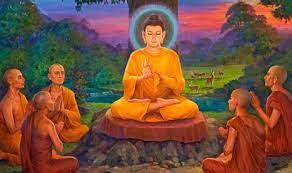Ya hablamos sobre el cristianismo, el catecismo y sobre lo que esta escrito en la biblia, pero ahora pasaremos al budismo así que comencemos.
Entre los budistas existe diversidad de opinión sobre la palabra homosexual. Aquí el budismo enseña que el goce sensual, el deseo en general y la sexualidad. en particular son obstáculos para encontrar la iluminación (nirvana), las ordenes budistas contemporáneas ACEPTAN la homosexualidad entre los laicos y la ordenación de personas pertenecientes al colectivo LGBTTTIQ+ varia en función a la traición.
Las ordenes budistas contemporáneas por lo general prohíben la transexualidad y la sexualidad activa en las ordenaciones religiosas, PEROOO aceptan la homosexualidad entre laicos.
Ahora el budismo asiático (el budismo en occidente) esta asociado con políticas de igualdad social y libertad del individuo, en parte como resultado de una gran clase media intelectual practicante y sus raíces filosóficas en la LIBERTAD DE PENSAMIENTO de la humanidad aconfesional.
En este hecho de aplicar la filosofía budista homosexual, los budistas occidentales ENFATIZAN la importancia que BUDA daba a la TORELANCIA y la búsqueda de respuestas en uno mismo. Buda hacia INCAPIE en los VAROLES EXISTENTES en la obra completa del BUDISMO mas que en el EXAMEN ESPESIFICO DE ALGUNOS PASAJES O TEXTOS, en si como resultado de ello el budismo occidental es totalmente GAY-FRIENDLY ESPECIALMENTE EN LA DECADA DE 1990 la INTERPRETACION de la conducta sexual errónea es una decisión individual y NO PUEDE ESTAR SUJETA A NINGUNA AUTORIDAD CENTRAL, punto de vista que acepta a la totalidad de la población.
El estudioso occidental Alexander Berzin propone un punto de vista interesante.
Los textos budistas tradicionales fueron ESCRITOS desde el punto de vista de un HOMBRE HETEROSEXUAL. ahora si exploramos la INTENCION de estos textos sobre el "COMPORTAMIENTO SEXUAL INAPROPIADO", su objetivo final ES ELIMINAR EL APEGO ,DESEO OBSESIVO E INSATISFACCION. si un HOMBRE HETERO SEXUAL NO ES CAPAZ DE CONTENER SUS EMOCIONES PERTUBADAS, PODRIA TENER SEXO CON LA PAREJA DE OTRA PERSONA O CON OTROS HOMBRES.
Aquí podemos aplicar la misma lógica y preguntar ¿Qué constituye el apego, el deseo obsesivo e insatisfacción para un hombre o una mujer homosexuales o una persona bisexual?. (no entendí la pregunta).
TRANSLADATED IN INGLESH
We already talked about Christianity, the catechism and what is written in the bible, but now we will move on to Buddhism so let's get started.
Among Buddhists there is a diversity of opinion about the word homosexual. Here Buddhism teaches that sensual enjoyment, desire in general, and sexuality. In particular they are obstacles to finding enlightenment (nirvana), contemporary Buddhist orders ACCEPT homosexuality among the laity and the ordination of people belonging to the LGBTTTIQ + collective varies depending on the betrayal.
Contemporary Buddhist orders generally prohibit transsexuality and active sexuality in religious ordinations, BUT they accept homosexuality among lay people.
Now Asian Buddhism (Buddhism in the West) is associated with policies of social equality and freedom of the individual, partly as a result of a large practicing intellectual middle class and its philosophical roots in the FREEDOM OF THOUGHT of non-denominational humanity.
In this act of applying homosexual Buddhist philosophy, Western Buddhists EMPHASIZE the importance that BUDDHA gave to TORELANCIA and the search for answers in oneself. Buddha towards INCAPIE in the EXISTING VAROLES in the complete work of BUDDHISM rather than in the SPECIFIC EXAMINATION OF SOME PASSAGES OR TEXTS, in itself as a result of it western Buddhism is totally GAY-FRIENDLY ESPECIALLY IN THE 1990s the INTERPRETATION of the behavior Sexual wrongdoing is an individual decision and CANNOT BE SUBJECT TO ANY CENTRAL AUTHORITY, a point of view that accepts the entire population.
Western scholar Alexander Berzin puts forward an interesting point of view.
Traditional Buddhist texts were WRITTEN from the point of view of a HETEROSEXUAL MAN. Now if we explore the INTENTION of these texts about "INAPPROPRIATE SEXUAL BEHAVIOR", their ultimate goal IS TO ELIMINATE ATTACHMENT, OBSESSIVE DESIRE AND DISSATISFACTION. If a SEXUAL HETERO MAN IS NOT ABLE TO CONTAIN HIS PERTUBED EMOTIONS, HE MAY HAVE SEX WITH ANOTHER PARTNER OR WITH OTHER MEN.
Here we can apply the same logic and ask what constitutes attachment, obsessive desire and dissatisfaction for a homosexual man or woman or a bisexual person? (I did not understand the question).


No hay comentarios.:
Publicar un comentario